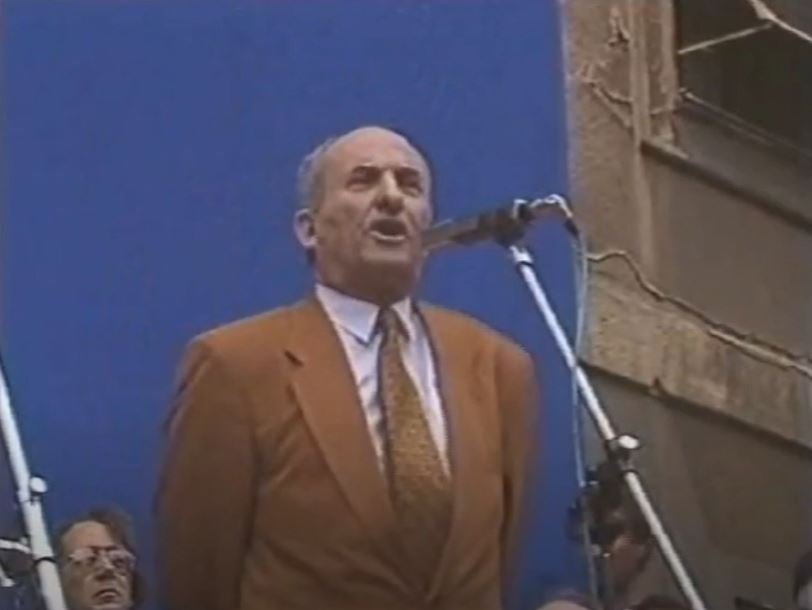On 29 August 1991 thousands of mothers from Croatia, Bosnia and Herzegovina, Macedonia, Kosovo and Serbia arrived in Belgrade where they made five demands in front of the General Staff building of the Yugoslav People’s Army (YPA): that soldiers whose one-year military service had expired be dismissed; that soldiers whose military service has not yet expired be relocated to their home republics; that the YPA withdraw to its barracks; that all military deserters be granted amnesty; and most importantly, the return of peace in the war caused by Greater Serbian aggression.
The convoy of mothers who were mobilized in the “Wall of Love” movement were followed all the way to Belgrade by the citizens of Croatia. However, rumours began to filter in from Belgrade about bad treatment of the mothers and their abuse at the hands of the military police. In short, the generals deceived them. The mothers’ requests were not accepted, they were taken to the Guard House on Topčider Hill, no one officially addressed them and media access was granted only to Serbian journalists.
During the morning of 30 August, disappointed and exhausted mothers returned to Zagreb where they were greeted by thousands of citizens. This show of support for the “Wall of Love” was particularly remembered for the legendary speech given by Vlado Gotovac in front of the headquarters of the Command of the 5th Military District of the Yugoslav People’s Army.
If the generals had a family, if the generals had children, if the generals had relatives, then they would not occupy this building of ours. But the generals have no one, I assure you! For he who kills another’s children has no children, for he who causes another’s mother to mourn has no mother; for he who destroys other people’s homes has no home. The generals must therefore know that there are no mothers, no children, no homes for them on this earth! They will die in the desolation of their dead hearts! Their children will be ashamed of them because they have lost the ability to love. Their wives will be ashamed of them because they were the murderers of other people’s children. Their families will be ashamed of them because they destroyed other people’s families.
Vlado Gotovac, August 30, 1991
After that, the “Wall of Love” gained popularity and spread throughout Croatia as well as abroad. Branches of the organization were soon established in France, Canada, Germany among other places. In September of 1991, the mothers left for the west. In Brussels, they presented the Croatian Women’s Appeal to Doris Pack, Member of European Parliament and were also received by Hans-Dietrich Genscher, Minister of Foreign Affairs of the Federal Republic of Germany where they found understanding and support.
The strength and influence of the ‘Wall of Love’ is evident in the fact that a portion of the September class of YPA conscripts returned to their homes. The executive committee then changed its name to the Mothers for Peace Movement and since September 1991 it is commonly referred to as the Wall of Love – Mothers for Peace Movement. The initiative spread to Serbia where the Movement of Serbian Mothers for Peace was soon established and who had little problem condemning Serbian-Montenegrin aggression against Croatia. The “Wall of Love” is active on several fronts, from its primary task to search for sons serving in the YPA, its significant contribution to the internationalization of the crisis in the former Yugoslavia and affirmation of the Republic of Croatia and, of course, its many humanitarian activities.
Source
Ljubić, Ivan. “Domovinski rat i prognaničko-izbjegličko pitanje 1991./1992.”. Graduation thesis, University of Zagreb, 2017
Graduated with a Master’s Degree in History from the University of Zagreb. He has worked at the Croatian History Museum and as a researcher for the popular TV Calendar program for Croatian Radio and Television. He has authored several books and documentaries about Croatia’s Homeland War and is the creator/producer of the immensely popular “It Happened on this Day – Homeland War” Facebook page as well as the online portal Domovinskirat.hr. Borna also is the host and editor of the daily segment “Patriotic Minutes” on Croatian Catholic Radio. He created CroHis to promote the values of the Homeland War and ensure that the sacrifices of those who defended Croatia’s independence would not be forgotten.

